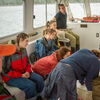
Who will step up? Maine nonprofits need leaders

Nonprofits are on the verge of losing large numbers of leaders. Almost half of our members at the Maine Association of Nonprofits (MANP) report they anticipate a leadership change in the next five years, and other estimates are even more dramatic. A 2015 study by Third Sector New England indicated that a majority of nonprofits are not prepared for the imminent departure of their leaders; 70% lack a succession plan. Like the MANP survey, the New England study also reports that 63% anticipate a transition soon and calls for organizations, like MANP, to help build a pipeline of leadership that will “strengthen the bench” and better prepare nonprofits for change.
Succession planning is not just about what to do when an executive director leaves. At its core, it is a strategy for keeping mission in the forefront as an organization navigates inevitable change.
In response, MANP launched an initiative called “Mission Driven Leadershift” to help shift the mindset about succession planning to one of deeper sustainability planning. Succession planning is not just about what to do when an executive director leaves. At its core, it is a strategy for keeping mission in the forefront as an organization navigates inevitable change. It is a process to identify organizational values and develop practices that safeguard the important work of an organization. MANP’s wide variety of services include a Mission-Driven Executive Transitions toolkit, board training on managing leadership transitions, competitively priced executive search services, and a Leadership Institute to train executive directors.
Preparing for this widespread need also requires cultivating and expanding the pipeline of future leaders for charitable nonprofits. Fortunately, millennials are eager to meet the challenge. “The Millennial Impact Report: 10 Years Looking Back” explains that younger people want to directly contribute to cause-related initiatives, especially through leadership roles.
MANP’s Emerging Leaders program, first created in 2010 by the Institute for Civic Leadership, is the direct result of feedback from young leaders, nonprofit organizations and other advisors. Having adopted the program in 2018, MANP continues to prepare and train young leaders in Maine communities for meaningful nonprofit board experiences by matching them to organizations that will benefit from their time and talent.
“There is a community of a younger generation that want to get involved in something meaningful, but don’t know where to begin,” said a 2018 Emerging Leader participant. “The young leaders bring new energy and perspective. In our fast-paced culture, this is so important.”
The ultimate goal is for Maine’s nonprofits to be supported by informed, committed board members who can guide their organizations responsibly, and to the greatest impact, through transition, opportunity and inevitable change.
Maine’s nonprofits play an essential role in our state’s economy and quality of life. The leaders of these organizations are well-positioned to influence and improve our communities. As a result, investing in the leadership development of those in key positions — whether current executive directors, emerging leaders, or board members — is essential to strengthening the capacity of nonprofits to address Maine’s most pressing challenges.










0 Comments